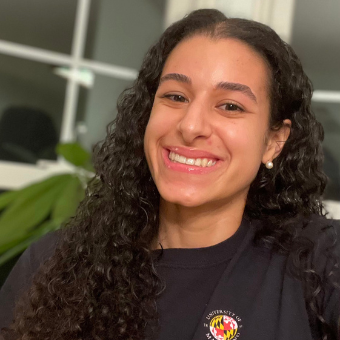
I wanted to push myself to meet new people and navigate the experience independently.
Fischell Department of Bioengineering (BIOE) junior Kaitlyn Watson knew two things when she first explored the idea of studying abroad. One, she knew she wanted to go where relatively few UMD students planned to travel. Two, she wanted to study at an institution that boasted a strong biotechnology program.
With these criteria in mind, Watson zeroed in on the Technical University of Denmark.
“I wanted to push myself to meet new people and navigate the experience independently,” Watson said. “Every day is a new adventure that includes discovering new places, new ways to communicate, and learning more about many different cultures.”
Throughout the spring 2022 semester, Watson grew increasingly comfortable operating in a truly global city, in which she routinely overhears conversations in myriad languages. She also rides a bike to university every day, and takes 4-hour classes. One of her favorite parts of the program was the opportunity to live in international housing, where she shared a kitchen with 12 other engineers from around the world. Some of her most memorable moments include going for a polar swim in February at the nearby beach, embarking on a 30 km bike ride and ferry trip to Sweden, seeing the northern lights, and taking a trip to Prague with her kitchen-mates.
“Studying abroad has been one of the most meaningful experiences of my life, and I believe anyone who has the chance should take it,” Watson exclaimed. “Whether you want to immerse yourself in a new culture, learn a new language, or live in a different country, studying abroad will give you an experience to grow and learn in ways you don’t know are possible.”
As a child, Watson always excelled in her STEM courses. “I always found myself excited to problem solve and I was curious about how science explained how the world worked,” she said. Eventually, Watson figured out that bioengineering was the right path for her.
At the University of Maryland, Watson has spent the past two years working as an undergraduate researcher in mechanical engineering professor Elisabeth Smela’s Laboratory for MicroTechnologies. Watson’s research focused on developing and characterizing strain-sensing aircraft paint for structural health monitoring of aircraft. The conductive material worked with was exfoliated graphite which we mixed into aircraft paint to create a piezoresistive paint. We looked at the sensitivity and reliability of the paint, how to repair damaged sensors, and the sensitivity of the strain gauge to different environments. Although Watson has enjoyed learning about and developing exfoliated graphite strain sensors; she hopes to pivot her future work toward immunology and drug delivery. In fact, Watson hopes to learn more about how disease affects the human body and the types of methods bioengineers can use to treat or cure diseases.
After graduation, Watson plans to work in biotechnology research either at a pharmaceutical company or with a federal lab. Her main career goals center on making a valuable contribution to the field and making a difference in someone's life. Watson also dreams of one day opening her own lab, becoming a mentor and teaching and encouraging others the same way her mentors have throughout the years.
Top